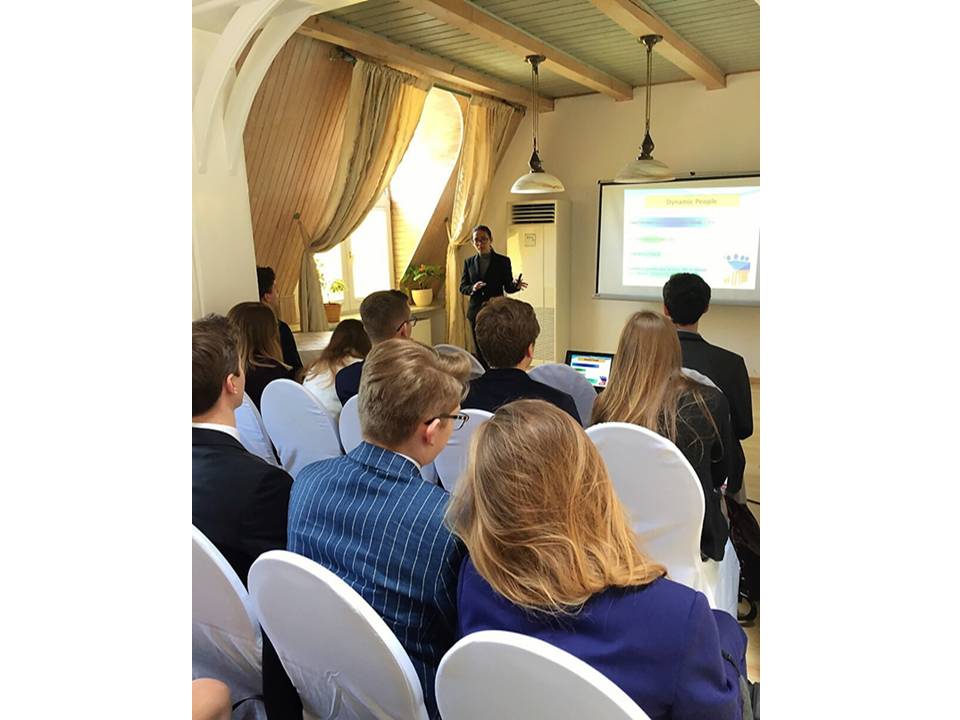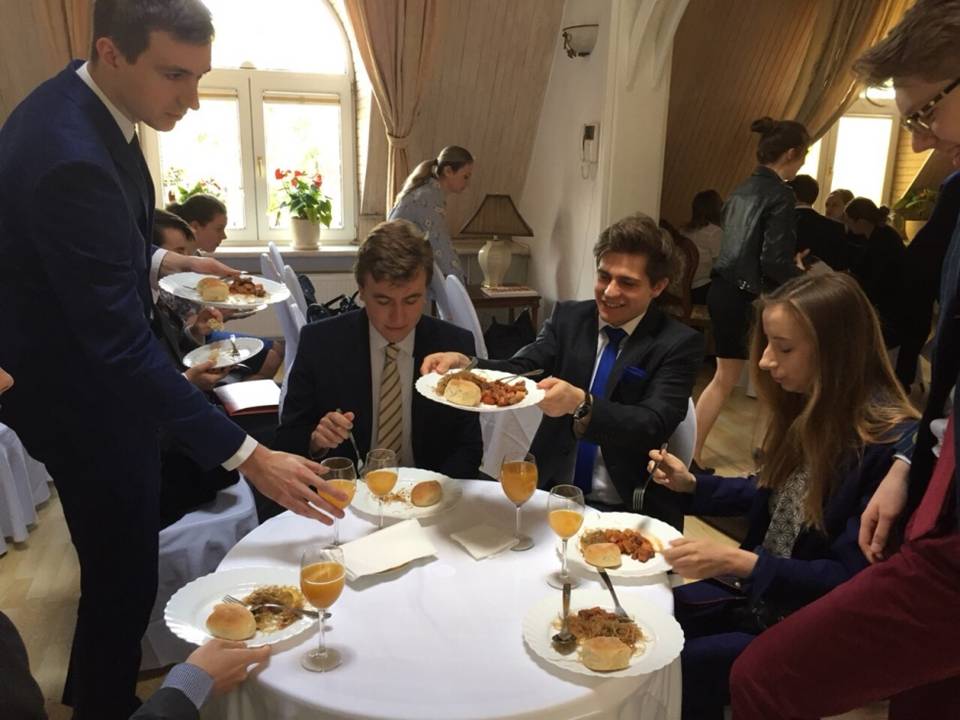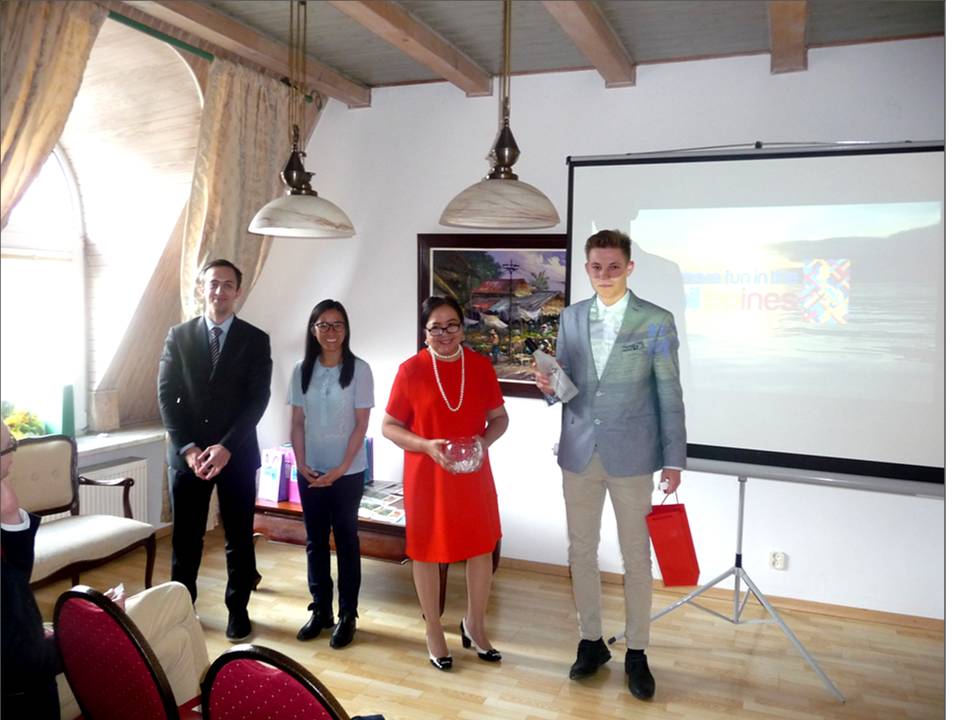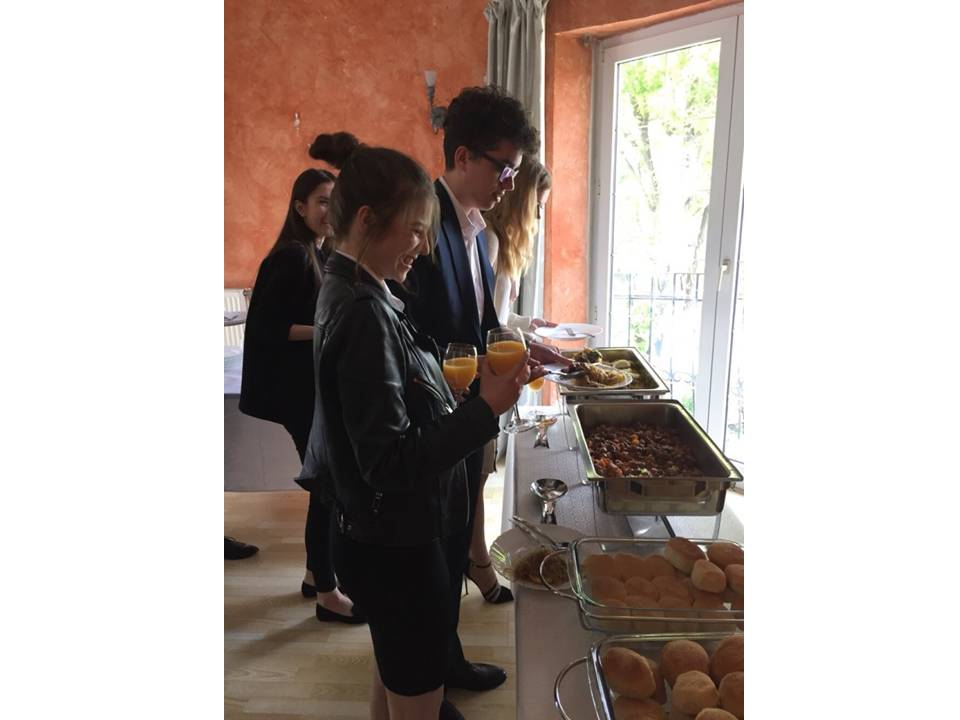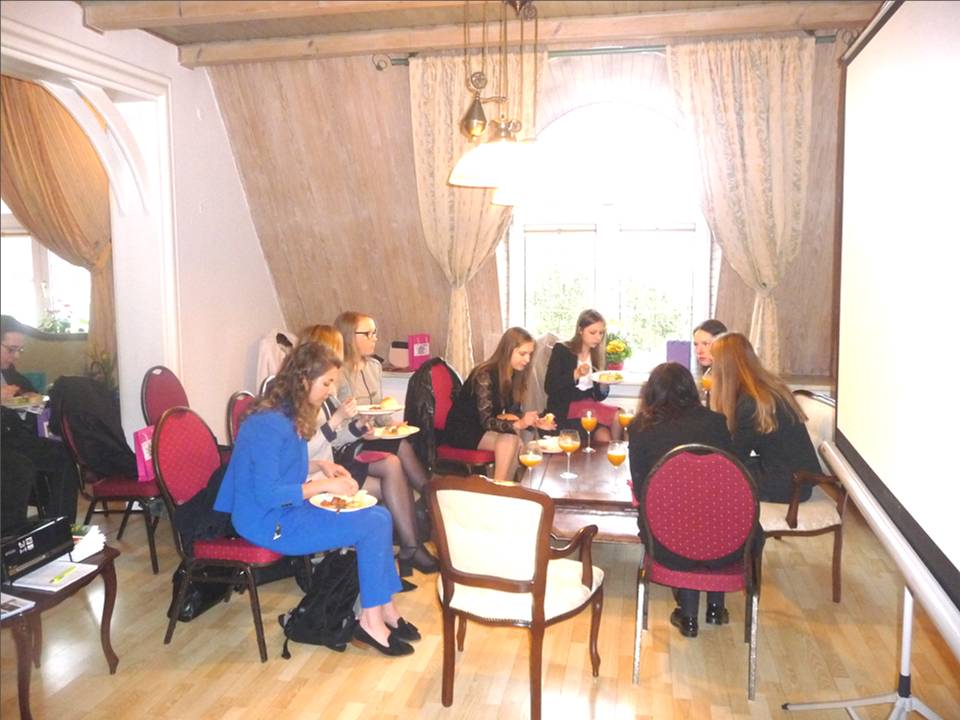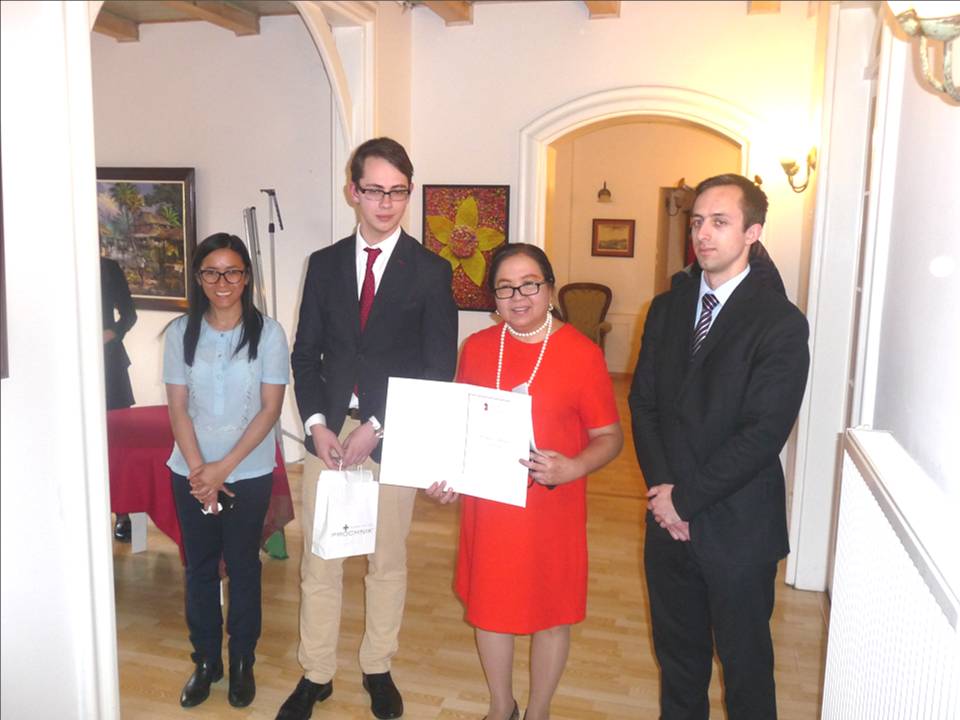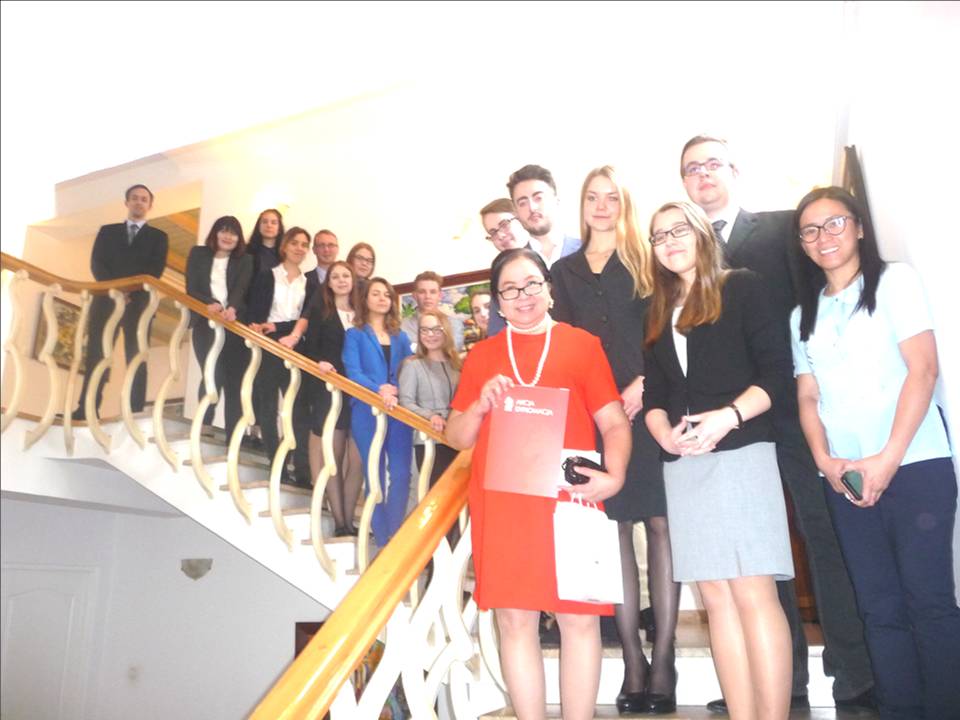Philippine envoy, Ambassador to Poland Ms. Patricia Ann V. Paez during the dialogue with Polish student-participants of the 6th edition of “Action Diplomacy”
Principal Assistant to the Ambassador for Economic and Cultural Diplomacy Mr. Oskar Groblewski briefing the Polish students on the Philippines’ headways under the Duterte administration
Promoting Philippine tourism and culture - Mr. Groblewski, assisted by Ms. Imelda de Joya, shows the Polish version of the “It’s More Fun in the Philippines” brochure; the Embassy also gave the students CDs of Philippine “kundiman”
The Polish students were also given samples of Philippine dried mangoes
A raffle was held after the presentations; photo shows a winner of the Philippines’ coconut-based vodka VuQo
As part of the Embassy’s “culinary diplomacy,” the participants were feted to a simple lunch of “lumpiang sariwa”, menudo, pan de sal and Philippine mango juice as refreshment
Participants of the “Action Diplomacy” presented a certificate of appreciation to the Embassy; L to R: Ms. de Joya, coordinator of Action Diplomacy Mr. Wojciech Ambroziak, Amb. Paez and Mr. Groblewski
A “family photo” with the Polish students at the Embassy
The Philippines’ war on drugs is not a “war against the poor” but a “war for the poor.” This was the central message which Philippine ambassador to Poland Ms. Patricia Ann V. Paez conveyed to the students-participants of the 6th edition of Action Diplomacy” who visited the Philippine Embassy in Warsaw on 06 April 2017.
A vast majority of the estimated four million victims of drug addiction in the Philippines are from the poor since a small sachet of “shabu” only cost 20 Philippine pesos (equivalent to about US forty cents) at the peak of the drug trade, prior to the Duterte government’s relentless crackdown on illicit drugs. She cited a government estimate that about 1/3 of overseas Filipino workers (OFWs) - most of whom ventured out of the country in search of jobs - have children who have been hooked on “shabu”.
Thus, she added, due to President Rodrigo Roa Duterte’s demonstrated resolve to combat the drug menace, he is always given a spontaneous rousing welcome by Filipino workers overseas for doing his best to keep their children away from harm’s way; from shielding them against drug-addled criminals who have been the culprits of the most unthinkable and heinous crimes; and from saving the next generation of Filipino youth from drug addiction.
Amb. Paez also said that if the war on drugs is indeed directed against the poor and the so-called extrajudicial killings are perpetrated by the government, the authorities would not have the problem of having to handle the almost one million drug addicts/pushers who voluntarily surrendered to them. The ratio between this number of surrenderees and the number of so-called extrajudicial killings which the government’s critics placed at around 7,000- even granting that this questionable figure is accurate - indicates that the security forces are not the perpetrators of those killings.
She also rhetorically asked if those behind the multi-billion dollar drug trade would just sit idly by as the government destroys their profitable “business.” There is a possibility that they are discrediting the government’s war on drugs by “sponsoring” those killings themselves; and hence, make this “war,” a target of international opprobium. She said that security forces who were alleged to have violated the ‘rules of engagement’ were placed under investigation. Explaining President Duterte’s tough talk laced with curses (“if you destroy my country, I will kill you”), Amb. Paez said that this is possibly the “only language which those criminals understand”.
The envoy informed the Polish students that against the backdrop of negative reports against President Duterte and the war on drugs, President Duterte continues to enjoy a high trust and approval rating from Filipinos which ranges from 76% to 85%. She pointed out that he is even leading an international poll, being conducted by Time magazine, on who is the “most influential person” in the world today. A recent survey conducted by a reputable Philippine polling firm showed that 85% of the respondents think that their neighborhoods have become safer because of the government’s war on drugs.
Before her dialogue with the students during the question and answer (Q & A) portion of the Embassy’s briefing on the Philippines, Assistant to the Ambassador for Economic and Cultural Diplomacy Mr. Oskar Groblewski gave an overview of the Philippines and the state of the country today.
Mr. Groblewski said that the Philippine economy is one the fastest growing economies in Southeast Asia today with a GDP growth of 6.8% in 2016. Touching on the ASEAN Economic Community which was established in December 2015, he said that the Philippines is an ideal platform for foreign investors to penetrate the ASEAN market which has a combined consumer base of at least 600 million and a young and skilled workforce. Mr. Groblewski also showed two Philippine tourism videos from the Department of Tourism (DOT).
As part of its “culinary diplomacy,” the Polish students were served a simple lunch of “lumpiang sariwa”, menudo, pan de sal and Philippine mango juice as refreshments. The Embassy also gave them samples of Philippine dried mangoes, CDs of Philippine “kundiman,” and the Polish version of “It’s More Fun in the Philippines” brochures. Raffled off were Philippine souvenir items which, among others, included a miniature of Philippine jeepney and Philippine coconut-based vodka under the brand “VuQo.”
Action Diplomacy is a project dedicated towards “furthering the knowledge of diplomacy, business, and geo-politics among the students in Polish universities”.
This is the 4th time since 2013 that the Philippine Embassy in Warsaw hosted the participants of Action Diplomacy.


